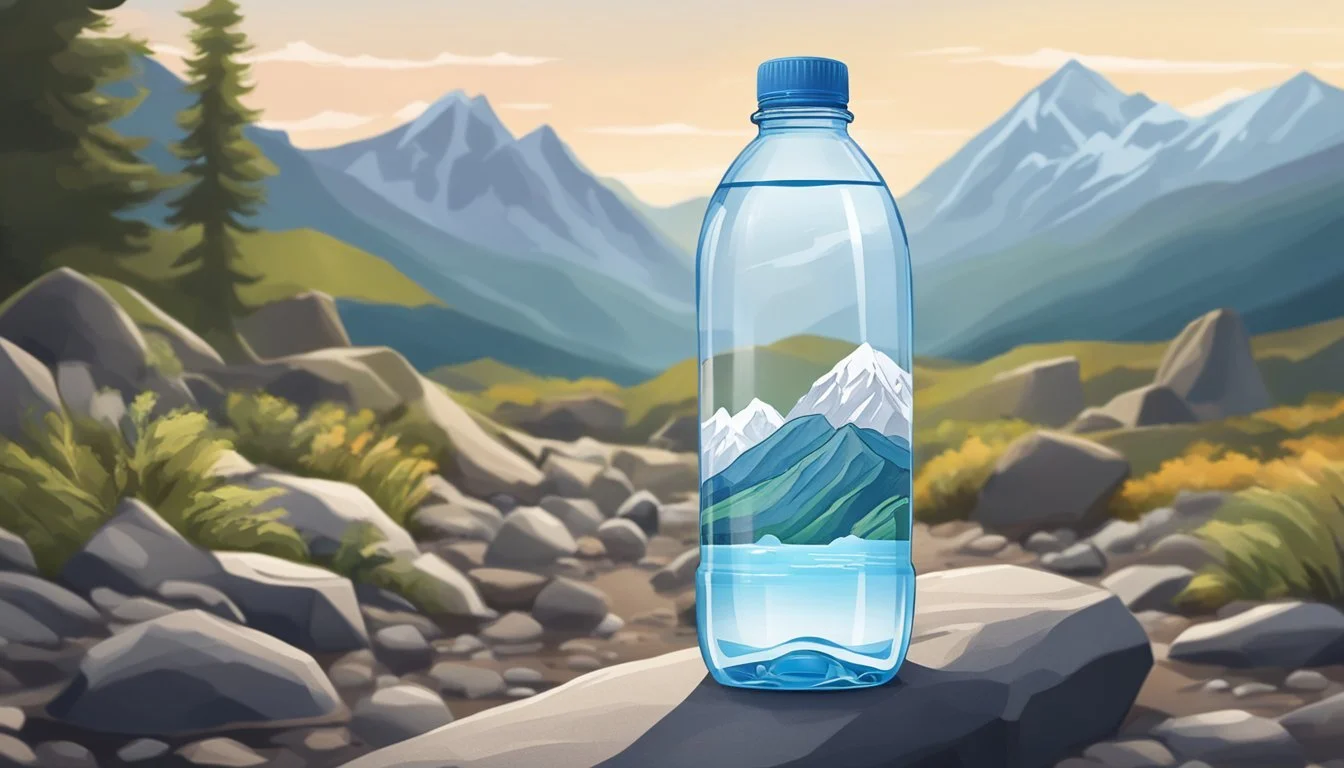Path vs. Cascade Mountain
Bottled Water Showdown
Choosing the right bottled water can be challenging in a market crowded with numerous brands. Path and Cascade Mountain stand out for their commitment to purity and taste. In the growing bottled water industry, both brands have carved out their niches with distinct attributes appealing to different consumer preferences.
Path Bottled Water excels with its eco-friendly packaging and crisp, clean taste that consistently earns high marks from consumers. Known for its innovative approach, Path offers a refillable aluminum bottle that reduces plastic waste, making it attractive to environmentally conscious buyers. On the other hand, Cascade Mountain prides itself on sourcing water from pristine, natural springs, delivering a refreshing, mineral-rich hydration experience.
For those prioritizing sustainability, Path might be the better choice. Cascade Mountain, meanwhile, appeals to those who favor a natural spring water taste. Both provide excellent hydration options, each with unique advantages that cater to specific consumer needs.
Understanding Bottled Water
Bottled water comes in various forms, each with unique characteristics and health implications. Safety and quality regulations also play a significant role in determining the reliability of different bottled water brands.
Defining the Terms: Purified and Spring Water
Bottled water is mainly categorized into purified and spring water.
Purified water undergoes processes like distillation, deionization, or reverse osmosis to remove impurities and contaminants. This type often lacks minerals unless they are added back during production.
Spring water, however, is collected from natural springs and usually contains essential minerals and electrolytes. The source is typically underground and has emerged at the surface naturally or through a borehole tapping.
Health Implications of Bottled Water
Health considerations around bottled water include its mineral content, pH levels, and potential contaminants. Spring water is valued for its minerals like calcium and magnesium, beneficial for bodily functions. A balanced pH between 7 and 8 is often preferred.
Contaminants like PFAS chemicals, heavy metals such as arsenic, and other pollutants can pose health risks. It's vital to check the water's quality reports for assurance. Despite strict regulations, some bottled waters may still carry unwanted impurities, warranting careful selection by consumers.
Bottled Water Regulations and Safety
Bottled water regulations are overseen by the FDA in the United States, while public water supplies are regulated by the Environmental Protection Agency (EPA). The FDA mandates bottlers to adhere to stringent standards for quality and safety, ensuring contaminants remain below harmful levels.
Annual quality reports by bottled water companies can provide transparency around their testing and purification methods. The FDA also restricts specific levels of hazardous substances like arsenic and heavy metals. Regular inspections and compliance with these standards help maintain bottled water safety.
This detailed understanding of bottled water helps in making informed choices depending on one's health requirements and safety expectations. By focusing on these factors, consumers can select the most suitable bottled water for their needs.
Comparing Path and Cascade Mountain
When evaluating Path and Cascade Mountain bottled waters, several factors come into play. These include the brand heritage, reputation, sourcing origins, and the natural filtration processes involved.
Brand Heritage and Reputation
Path positions itself as a sustainable bottled water brand, emphasizing eco-friendly practices and a clean supply chain. It aims to appeal to environmentally conscious consumers by offering a product that not only quenches thirst but also lessens environmental impact. Path's commitment to sustainability is a significant selling point.
Cascade Mountain, on the other hand, is recognized for its high-quality natural spring water sourced from pristine locations. Its reputation is built on providing pure, refreshing water with a smooth taste. The brand often highlights its long-standing presence in the market and dedication to maintaining the natural purity of its water.
Sourcing the Water: Origin and Natural Filtration Processes
Path sources its water through a meticulous selection process aimed at ensuring purity and sustainability. The brand's water is often filtered using advanced techniques that do not compromise its natural mineral content. This process ensures that consumers receive clean, balanced water in every bottle.
Cascade Mountain takes pride in its water source, which is typically a natural spring located in a remote, unpolluted area. The natural filtration processes, including layers of rock and soil, contribute to the water's unique mineral profile. This naturally filtered water is renowned for its clean taste and quality.
By focusing on their sourcing methods and natural filtration, both brands aim to deliver superior bottled water while maintaining their unique values and commitments.
Analyzing Water Quality and Taste
To determine which bottled water is better between Path and Cascade Mountain, it's essential to examine their water quality and taste. Both factors play a significant role in customer preference and health effects.
pH Levels and Mineral Content
Path and Cascade Mountain waters exhibit varying pH levels and mineral compositions. Path water typically has a neutral to slight alkaline pH between 7.0-8.0. This range helps maintain body pH balance. Cascade Mountain features a slightly higher alkaline pH of around 8.1, which some consumers prefer for its potential health benefits.
When looking at mineral content, Path includes minerals like calcium, magnesium, and potassium, enhancing its taste and nutritional value. Cascade Mountain water includes higher bicarbonates and total dissolved solids (TDS), contributing to its smooth texture and subtle sweetness. Bicarbonates particularly help neutralize stomach acid and can improve digestion.
Water Brand pH Level Notable Minerals Path 7.0-8.0 Calcium, Magnesium, Potassium Cascade Mountain 8.1 Bicarbonates, TDS
Taste Profile and Water Sommelier Insights
Taste is a key differentiator between Path and Cascade Mountain. Path water is often described as clean and crisp, with a neutral flavor that appeals to those preferring a straightforward water experience. Its minimal mineral content ensures a light feel without overpowering the palate.
Cascade Mountain, on the other hand, is renowned for its velvety texture and faintly sweet undertone. Water sommeliers often highlight its rich mineral profile, especially the bicarbonates, which lend it a complex and refined taste. This makes it a favorite among aficionados who appreciate depth in water flavor.
Both brands excel in different aspects, providing varied sensory experiences tailored to different preferences. Summarily, Path is a go-to for those who enjoy simplicity, while Cascade Mountain offers a more intricate tasting journey.
Environmental Considerations
Environmental issues related to bottled water are critical in comparing Path and Cascade Mountain. Key factors include the environmental impact of production and alternatives to single-use plastic.
Environmental Impact of Bottled Water Production
Producing bottled water involves numerous environmental concerns. The Environmental Protection Agency (EPA) identifies that the extraction of water resources can lead to habitat destruction and loss of biodiversity.
Path and Cascade Mountain use different methods for sourcing and bottling their water. Path employs sustainable practices, including minimizing water waste during extraction and ensuring responsible sourcing. Cascade Mountain focuses on similar sustainability practices but has come under criticism for water usage in water-scarce areas.
Single-Use Plastic and Alternatives
Single-use plastic pollution is a pressing issue. A significant portion of bottled water packaging ends up in landfills and oceans. Recyclability is crucial as well.
Path uses reusable bottles, which can significantly reduce waste. Cascade Mountain primarily uses glass bottles, which are more environmentally friendly compared to plastic but heavier, increasing transportation emissions.
Boxed water is another alternative Path explores, providing a more eco-friendly option compared to traditional plastics. Solutions in reducing single-use bottle dependency and shifting toward sustainable alternatives are part of an ongoing revolution in the bottled water industry.
Comparing these practices reveals strengths and areas for improvement in both brands.
Consumer Choices and Accessibility
When considering bottled water options, various factors like availability in stores and consumer reports play a crucial role. Path and Cascade Mountain are both scrutinized for their distribution and consumer feedback.
Availability in Grocery Stores and Retailers
Path water is known for its wide availability in major grocery chains. It can be found in stores such as Whole Foods and other well-known retailers. This extensive distribution makes it a convenient option for many consumers.
Cascade Mountain, on the other hand, has a more region-specific presence. Its availability may vary depending on the region, making it a bit more challenging for some consumers to locate. However, it also appears in several large retailers, securing a reasonable market presence.
Online availability for both brands further increases consumer accessibility. Major e-commerce platforms like Amazon offer both Path and Cascade Mountain, ensuring that even those without easy grocery store access can purchase them.
Consumer Reports and Recommendations
Path water often receives positive remarks in consumer reports. Reviews highlight its eco-friendly packaging, a significant factor for environmentally conscious buyers. The taste is also noted as refreshing and clean, making it a popular choice among various consumer demographics.
In contrast, Cascade Mountain is appreciated for its premium quality. While it might be a bit pricier, consumers often argue that the taste and purity justify the cost. Recommendations frequently mention the clear, crisp taste, and the attractive packaging adds to its appeal.
While Path is praised for accessibility and environmental consciousness, Cascade Mountain garners loyalty through its quality and premium feel. Both brands have their unique strengths, as highlighted in diverse consumer feedback.
Health and Hydration Benefits
Choosing the right bottled water can impact your hydration status and provide essential minerals beneficial for health. Path Water and Cascade Mountain each offer unique features that may appeal to different preferences and needs.
Hydration Efficacy of Different Water Types
Path Water, known for its reusable aluminum bottles, offers purified water that aims to meet daily hydration needs efficiently. Cascade Mountain, on the other hand, provides spring water, which many believe offers a more natural hydration source due to its origin.
Both waters contribute to maintaining fluid balance, but spring water like Cascade Mountain’s might contain trace minerals naturally, enhancing the body's hydration processes. Purified water is free from contaminants, making it a reliable choice for consistent hydration, particularly in settings where water quality is uncertain.
Essential Minerals for Health
Minerals such as magnesium, calcium, and potassium are crucial for maintaining overall health. Cascade Mountain spring water often contains these essential minerals, which can support bone density (calcium), muscle function (magnesium), and electrolyte balance (potassium).
Path Water’s purified water, while possibly less mineral-rich, ensures no unwanted substances, offering a clean hydration option. For consumers focused on mineral intake, spring water might provide additional benefits. For those prioritizing purity and environmental concerns, Path Water's option stands out.
Choosing between Path and Cascade Mountain should align with individual health goals and lifestyle needs.
The Future of Bottled Water
Future advancements in the bottled water industry focus on innovative technologies and shifting consumer preferences towards sustainability and quality.
Innovations in Bottled Water
The bottled water industry is keen on adopting cutting-edge technology. Smart water bottles equipped with sensors are entering the market, providing real-time hydration tracking. Companies are also investing in eco-friendly packaging, such as biodegradable bottles and plant-based plastics, to reduce environmental impact.
Brands are exploring advanced purification methods. Techniques like reverse osmosis and UV light treatment are becoming more common. Furthermore, adding functional ingredients like vitamins and minerals is a growing trend. These innovations aim to differentiate products in a competitive market and appeal to health-conscious consumers.
Predictions and Trends in Consumer Preferences
Consumer preferences are shifting towards sustainability. More people are opting for reusable bottles over single-use plastics. This has prompted brands to emphasize their sustainability efforts, such as reducing plastic waste and using recyclable materials.
Health and wellness trends are also influencing the market. There's an increasing demand for enhanced water varieties that contain added benefits like electrolytes and probiotics. Transparency about water sources and purification processes is becoming essential. Customers want to know where their water comes from and how it's treated.
Membership in organizations like the International Bottled Water Association (IBWA) is growing, as consumers seek assurance about the quality and safety of the products they choose. Brands that align with these trends are likely to thrive in the evolving market.
Bottom Line: Choosing Between Path and Cascade Mountain
Choosing between Path and Cascade Mountain comes down to individual preferences and requirements.
Quality: Both brands maintain high standards. Path bottled water emphasizes sustainability with its reusable aluminum bottles. Cascade Mountain, known for its outdoor gear, offers water that aligns with its reputation for reliability and quality.
Taste: Path water generally has a clean taste enhanced by reverse osmosis and mineral addition. Cascade Mountain water is praised for its refreshing, natural flavor, sourced from pristine environments.
Packaging: Path stands out with its eco-friendly packaging. The aluminum bottle is durable and recyclable, promoting a reduced carbon footprint. Cascade Mountain typically uses traditional plastic bottles but ensures they are BPA-free and recyclable.
Feature Path Cascade Mountain Sustainability High (reusable aluminum bottles) Moderate (plastic bottles, recyclable) Taste Clean, mineral-enhanced Natural, refreshing Price Generally higher due to packaging Moderately priced Availability Widely available online and in stores Available online and in specialty stores
Price: Path tends to be slightly more expensive due to the cost of its packaging and sustainability initiatives. Cascade Mountain offers a more conventional pricing model, typically making it more affordable.
Environmental Impact: Path emphasizes reducing plastic waste with its reusable bottles, making it suitable for environmentally conscious consumers. Cascade Mountain, while using plastic, ensures recyclability and maintains certain eco-friendly practices in production.
When choosing between Path and Cascade Mountain, consider factors like taste, sustainability, price, and personal values to find the water brand that fits best.
More About Path
Mountain Valley Spring Water vs Path: Which Bottled Water is Better?
Path vs Whole Foods Italian Still Mineral water: Which Bottled Water is Better?
More About Cascade Mountain
Acqua Pana vs Cascade Mountain: Which Bottled Water is Better?
Antipodes vs Cascade Mountain: Which Bottled Water is Better?
Aqua Carpatica vs Cascade Mountain: Which Bottled Water is Better?
Aquafina vs Cascade Mountain: Which Bottled Water is Better?
Arrowhead vs Cascade Mountain: Which Bottled Water is Better?
Boxed Water vs Cascade Mountain: Which Bottled Water is Better?
Cascade Mountain vs 1907water: Which Bottled Water is Better?
Cascade Mountain vs 7-Select: Which Bottled Water is Better?
Cascade Mountain vs Alkaline88: Which Bottled Water is Better?
Cascade Mountain vs Big Chill: Which Bottled Water is Better?
Cascade Mountain vs BodyArmor: Which Bottled Water is Better?
Cascade Mountain vs CBD Living: Which Bottled Water is Better?
Cascade Mountain vs Crystal Geyser: Which Bottled Water is Better?
Cascade Mountain vs Crystal Lake: Which Bottled Water is Better?
Cascade Mountain vs Essence pH10: Which Bottled Water is Better?
Cascade Mountain vs Kirkland Signature: Which Bottled Water is Better?
Cascade Mountain vs Open Water: Which Bottled Water is Better?
Cascade Mountain vs Proud Source: Which Bottled Water is Better?
Cascade Mountain vs Pure Life: Which Bottled Water is Better?
Cascade Mountain vs Refreshe: Which Bottled Water is Better?
Cascade Mountain vs Richard's Rainwater: Which Bottled Water is Better?
Cascade Mountain vs Simple Truth: Which Bottled Water is Better?
Cascade Mountain vs Talking Rain AQA: Which Bottled Water is Better?
Cascade Mountain vs The Well: Which Bottled Water is Better?
Cascade Mountain vs Weird Water: Which Bottled Water is Better?
Cascade Mountain vs Whole Foods 365: Which Bottled Water is Better?
Castle Rock vs Cascade Mountain: Which Bottled Water is Better?
Core Hydration vs Cascade Mountain: Which Bottled Water is Better?
Deer Park vs Cascade Mountain: Which Bottled Water is Better?
Essentia vs Cascade Mountain: Which Bottled Water is Better?
Hawaii Volcanic vs Cascade Mountain: Which Bottled Water is Better?
Hawaiian Springs vs Cascade Mountain: Which Bottled Water is Better?
Ice Mountain vs Cascade Mountain: Which Bottled Water is Better?
Icelandic Glacial vs Cascade Mountain: Which Bottled Water is Better?
Just Water vs Cascade Mountain: Which Bottled Water is Better?
Liquid Death vs Cascade Mountain: Which Bottled Water is Better?
Mananalu vs Cascade Mountain: Which Bottled Water is Better?
Mountain Valley Spring Water vs Cascade Mountain: Which Bottled Water is Better?
Nestle Pure Life vs Cascade Mountain: Which Bottled Water is Better?
Poland Spring vs Cascade Mountain: Which Bottled Water is Better?
Purely Sedona vs Cascade Mountain: Which Bottled Water is Better?
San Pellegrino vs Cascade Mountain: Which Bottled Water is Better?
Smartwater vs Cascade Mountain: Which Bottled Water is Better?
Solan de Cabras vs Cascade Mountain: Which Bottled Water is Better?
Topo Chico vs Cascade Mountain: Which Bottled Water is Better?
Tru Alka vs Cascade Mountain: Which Bottled Water is Better?
Whole Foods Italian Still Mineral water vs Cascade Mountain: Which Bottled Water is Better?
Zephyrhills vs Cascade Mountain: Which Bottled Water is Better?








